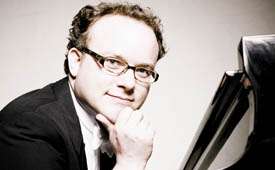|
Back
Voyage to Exotic Lands New York
Zankel Hall, Carnegie Hall
05/11/2010 -
Ludwig Van Beethoven: Sonata No. 1 in F Minor, Op. 2, No. 1
Frederic Rzewski: Nanosonatas, Book 1
Henri Dutilleux: Three Preludes: “D’Ombre et de silence” (Shadow and Silence), Sur un même accord (“On the same chord”), Le Jeu des contraires (The Game of contraries)
Robert Schumann: Sonata No. 1 in F-sharp Minor, Op. 11
Nicolas Hodges (Pianist) 
N. Hodges (© Marco Borggreve)
Nobody has ever doubted Nicholas Hodges’ imagination in programming. He is the dream pianist for modern composers, many of whom–like Birtwistle, Rihm and Sciarrino–love to write for him. Presumably he can take the most complicated score and play it problem free. Even those who don’t write specifically for him are certain to get a bravura performance, since he can make transparent whatever may seem to be blurred on the open page.
His program last night was like a voyage of dreams. The departure wharf was the familiar early Beethoven. His next two ports of call were exotic, alien, sometimes phantasmagorical. And then, just to show that this was only a dream, he ended with an early “love sonata” from Robert Schumann
Mr. Hodges took no liberties with the first and last works. One sometimes expects a specialist in contemporary music–and one who presently teaches the relationship of old to new in a Stuggart academy–to add some quirks to older works, but that was not true here. Yes, he seemed to sail through Beethoven’s first Sonata, but playing with a dry touch gave it Haydnesque exuberance.
Nor was he idiosyncratic with Schumann’s First Sonata. The sounds were crystalline, the touch was exquisite and, with the score in front of him, he played the music to the letter, without an iota of romantic rubato or especial phrasing.
Actually, this was not surprising. In his last appearance in New York, Mr. Hodges performed Ravel’s Left Hand Concerto with an equitable temperament, doing no violence to an especially sensitive piece.
Mr. Hodges is respected in all his choices, but the audience had come to hear the rarely played Nanosonatas by Rzewski. That wonderful composer, now in his 70’s, ironically resembles Hans Werner Henze. Both of them dedicated Leftists, and neither of them writing music which is y pablum for the proletariat. The first piece I ever heard of Rzewski was The People United Will Never Be Defeated, expecting a rip-roaring tribute to the Chilean song going back to the Allende era. Rip-roaring, though, is hardly the word I would use for these complex (and, after some hearings) delightful variations.
Nanoosnatas was exactly what the title says: seven “sonatas” each three minutes long, each with two themes, but no real development, only lots and lots of notes. Rzewski took the meat from the sonata form and left an intriguing series of skeletons.
Even without the title, the series of scales, with Baroque counterpoint, was almost whimsical. They could have been improvised like jazz (and had a jazzy flavor, if not rhythm), and they also had Mr. Rzewski’s tough and tough-minded skill. (Watching him on YouTube, I saw an extraordinary pianist as well as composer). Toward the end, Mr. Hodges knocked on the piano several times, in martial spirit, but in the most superb moment, he spoke–or barked–with the piano, the words from Genesis, with God admonishing Cain for killing his brother. Mr. Hodges played it with true dedication.
Rzewski is a pioneer in a very American sense. The next work could only have been written by a French composer. Dutilleux’s Three Preludes were pure atmosphere. At times it was Debussy in his more ethereal prelude mode, at times Messiaen pressing down the pedal with overtones and overlapping harmonies.
More often, it was Mr. Hodges bringing his own moods to the works, letting them softly soar and langorously land until the last notes simply rose, hovered and disappeared on the extreme high notes of the piano into space.
Harry Rolnick
|